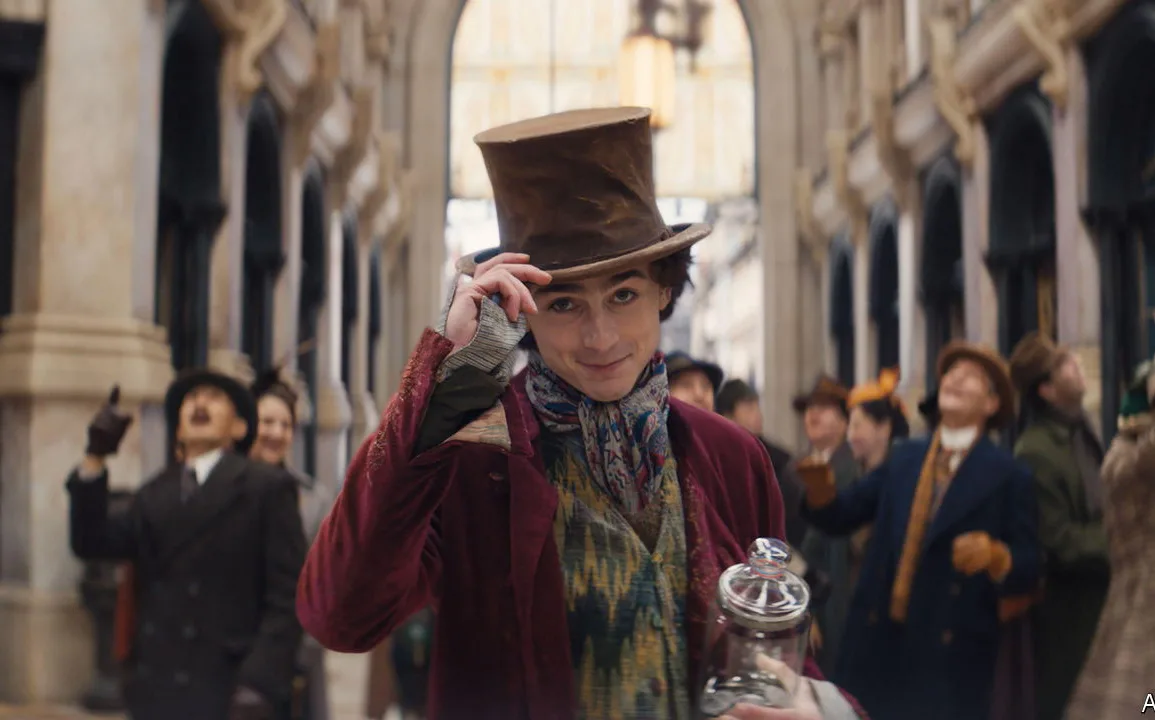
LORD BYRON intended to publish his memoir, but his literary executor burned it instead. T.S. Eliot is thought never to have wanted songs made about his cats. Terry Pratchett, a British fantasy writer, had imagination: his former assistant honoured Pratchett’s wish to have a steamroller crush a hard drive containing the author’s unfinished stories.
Roald Dahl, author of dark, delightful children’s tales, might have done something equally drastic had he known scriptwriters would conjure up a teenaged Willy Wonka. Dahl, who died in 1990, detested the first film made of his “Charlie and the Chocolate Factory”. It is hard to imagine him cheering its prequel, “Wonka”, which will be released in December. In it, young Willy, played by Timothée Chalamet (pictured), faces off against a chocolate cartel.
Authors have long have tried to control what happens to their works after they die—and mostly failed. Yet Dahl’s legacy represents a new twist in the tale. Huge sums paid in 2021 for his estate by Netflix, a streaming service, have helped spur a gold rush to mine dead authors’ estates. Once it was intrusion by snoopy biographers that worried writers most. Today it is the temptation among heirs to monetise every shred of creative output.
Voracious hunger for new content from streaming services and film studios is driving this new interest in old books. Shrewd video producers, faced with bidding wars for hot new titles, have turned to more affordable options: novels written decades ago. The rights for these “backlist” works generally belong to an estate for 70 years after an author’s death. After that, the work enters the public domain, and estates can no longer profit from or control it. Consider “Winnie the Pooh: Blood and Honey”, a film released this year, in which Pooh and Piglet, A.A. Milne’s loveable, nearly 100-year-old characters, become bloodthirsty killers.
Copyright-protected works are ripe for technological transformation. They can be milked in various ways, including selling the rights for translations into new languages, permitting “continuation novels” penned by living authors and making streaming series. For example, “The Queen’s Gambit”, which is best known as a show on Netflix, was actually based on a novel published in 1983.
Traditionally, managing the intellectual property of an author’s estate was a low-key affair left to grand-nephews and harried former agents. The modern era of more actively exploiting rights began 15 years ago, when star agents in America and Britain started vying for the estates of Ian Fleming, Evelyn Waugh and Vladimir Nabokov. The heirs of Agatha Christie and Dahl, meanwhile, set up companies to oversee growing empires.
When Dahl’s grandson, who ran the Roald Dahl Story Company, sold the writer’s catalogue to Netflix for an estimated $700m, the sleepy literary world woke up to the business potential of older works. (This was in addition to a separate deal from one already struck with Warner Bros, which gave the studio the right to make “Wonka”.) A reimagining of “The Wonderful Story of Henry Sugar” and three other Dahl tales by Wes Anderson, a film-maker, arrived on Netflix in September; two series on the Oompa-Loompas and other Dahl characters are planned with Taika Waititi, a director from New Zealand.
Even without the blockbuster treatment Dahl’s work has got, estates can prove profitable, as old print titles are packaged into new formats. Audiobooks are booming; in America sales have risen by at least 10% annually in recent years, with a spike of 25% in 2021, according to the Audio Publishers Association, an industry group. Major book publishers recently announced a deal with Spotify, a streaming service, to offer audiobooks as a subscription. New formats could help authors’ estates generate new royalties.
The big money, though, is in screen adaptations. The global market for video streaming is expected to exceed $400bn by 2030. The year 2020 was the first time more books were turned into TV series than into films, according to Publishers Marketplace. Stories about spies, detectives and children’s characters are natural subjects for shows. They are “golden brands”, explains Nicola Solomon, boss of the Society of Authors, which acts as trustee for 58 of its members’ estates. “For better or worse, we live in a brand-driven world, and people buy brands that are familiar,” she adds.
The bonanza has spawned a powerful new player. In 2019 a consortium of lawyers, agents and television promoters called International Literary Properties (ILP) set up shop in New York and London to do this at scale. “There are so many wonderful, unappreciated novels from the past,” says Hilary Strong, the former chief executive of Agatha Christie Limited who co-founded ILP. “What we are trying to do is open them up and bring them back for new generations to understand.”
Backed by private equity, ILP has acquired part or all of about 50 literary estates. Its portfolio now includes works of classic writers, such as Langston Hughes, Somerset Maugham and Georges Simenon. In 2021 the company sold rights for a drama series featuring Simenon’s Parisian police inspector, Jules Maigret. With 84 Maigret novels to choose from, it does not take a detective to deduce that it could be a long-running show.
Some heirs are flummoxed by the new corporate interest in the intellectual property. In effect, literary estates are a new kind of asset class. Managed well, they can provide steady income. And like tech startups, some hold “the potential for a sudden explosion”, says Ms Solomon.
But many heirs and executors are just glad to find new audiences for their forebears’ work. Take the novels of Octavia Butler, an African-American science-fiction pioneer, who died in 2006 after attracting many awards but little commercial success. Her estate, led by her former agent, authorised new editions, which in turn propelled the late author onto bestseller lists. New graphic novels have been published, and two tv shows are in development, including “Wild Seed”, starring Viola Davis, an American actress.
Grave problems
Yet resuscitating old stories comes with risks and thorny questions. Is it permissible to dress old stories in new packaging to appeal to contemporary tastes? And what should executors do about racist or sexist depictions? Attempts to “update” texts can easily blow up. Just think of the cries of “censorship” when the estate of Dr Seuss decided to withdraw certain titles in 2021 because of the author’s racial stereotyping. Most controversial are decisions to sanitise old books of offensive words, as editors at Penguin Random House did earlier this year with a string of Dahl’s children’s titles, which were reviewed by “sensitivity readers”.
PEN, an advocacy group for authors, wrote in a scathing recent report that “part of the usefulness of reading older books is in critically evaluating their attitudes and arguments. Changing the text of classic books after their original publication is, in a sense, revising history.” Michael Katakis, a writer who managed the Ernest Hemingway estate for more than 20 years, agrees. “The words from the past are signposts of where we’ve been and where we’ve travelled from, and it is how we determine if we have improved or if we haven’t moved very far at all.”
Trickiest of all are so-called “continuation novels” such as “Julia,” a brilliant recent retelling of George Orwell’s “1984” from a feminist perspective. Traditionalists who might accept a new treatment of a classic in another medium often bridle at books that appear to change the intellectual legacy of a great author.
But controversy is not bad for sales. Like Dahl’s beloved character Charlie Bucket, desperate to enter Wonka’s mysterious factory, there is nothing to deter investors and film studios from continuing to sift through back catalogues, in their hunt for a golden ticket. ■


